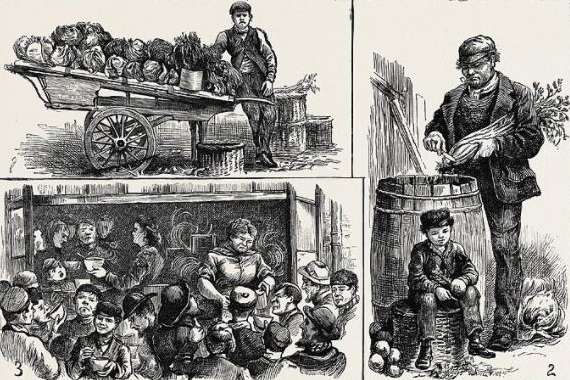Post
REPORT | 'The City beyond the City': London's Public Street Markets
24 Jan 2018
For our first talk of 2018 the Society had something slightly different - trespassing on London Historians' patch, Dr Peter Jones of the Centre for Metropolitan History gave a 'straight' history talk on the public street markets of the 19th century. However - as with so much about the capital - what happened then has had an influence on now, and several of the features of the market and the lessons of their growth have parallels for today and the planning of the future.
Peter looked at how the rapid growth of the capital in the 18th and 19th centuries meant that a large proportion of the new suburbs - particularly those new areas beyond the traditional confines of the City walls and the City of Westminster - were some distance from the existing licensed, regulated, 'fixed' markets, and needed traders (either barrowmen or dealers carrying produce on their backs) to supply food at the lowest prices. This saw the growth of unlicensed street markets in areas such as Whitechapel, Strutton Ground, 'The Brill' (Somers Town), the New Cut and Whitecross Street. These were often of some considerable size - over 200 stalls were counted in Whitecross Street on a typical day.
At times just about tolerated by the authorities, at other times subject to action by the police, the church and government to try to close them down, these markets provided a vital need. Even those who campaigned against the markets admitted that the food supplied was often of good quality and that the areas were dependent upon them.
Much of the objection to the unlicensed markets came from the City - who felt that their licensed, permanent markets were being adversely affected - or from reasons of 'morality'. The costermongers (traders in perishable produce) were felt almost to be a class apart, utterly undeferential, obstructive and amoral, and these aspects of their character clashed both with the upper class sense of an ordered society, and the middle class wish to 'improve' the working classes.
What Peter's talk vividly showed was how London is adaptive and entrepreneurial - if a need for something exists, someone will supply that need. And how - despite money, law, planning and best intentions - often London resists order, resists planning; it evolves and changes in ways in which it is almost impossible to predict.
The Society will be coming back to the theme of 'markets' throughout 2018, with a series of talks, walks and visits of physical market spaces as well as London's dependence on trade and 'the market'.
Our thanks to Studio Egret West for hosting the evening.
